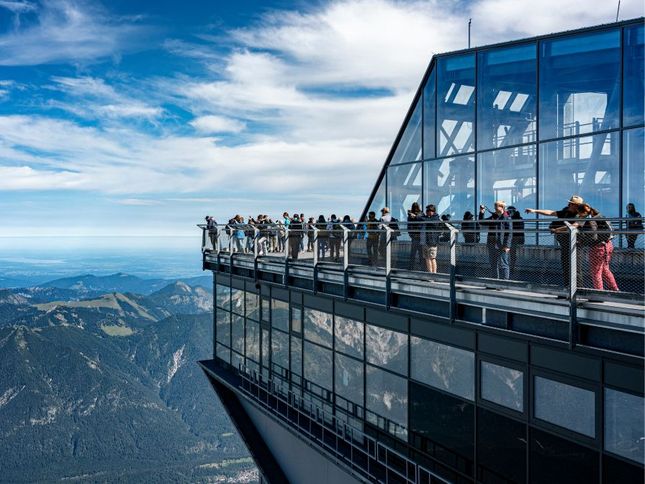


Science thrives on exchange: The LRZ installs and manages the Munich Scientific Network (MWN) and develops practical services for networking researchers and institutes.
Quickly ask your colleagues a question via chat, exchange even the largest files online or access research data sets or even high-performance computer resources remotely: Nothing in the world of digitalised science and research works without the internet and wireless communication. That is why the LRZ has been building and managing the infrastructure for reliable and secure networks for more than 60 years. A complex task: On the one hand, communication and data transfers need to be protected against attacks; on the other, science needs uncomplicated and openly accessible connections. No matter whether it’s the Munich Scientific Network, BayernWLAN or international connections – we create our networks in collaboration with reliable, creative partners such as the German National Research and Education Network (DFN) or Géant.
From the highest peak of the Wetterstein Mountains to Freising, from Weihenstephan to the Wendelstein or even Lake Starnberg: The Munich Scientific Network (MWN) not only connects the most beautiful regions of Bavaria, it also connects all of Munich’s universities with their faculties, halls of residence and regional research institutes via fibre optics. It also allows researchers, lecturers and students to access the Internet and many other practical network services for communication and data exchange free of charge. The MWN was developed step-by-step in the 1980s before being connected to the German Scientific Network around 1990 and then to countless European research networks around 2010. Europe’s science is moving ever closer together as a result.

Based on the Munich Scientific Network (MWN), institutes and research facilities are setting up their own wireless connections to the Internet – for example, to provide students, lecturers and employees with a permanent, low-cost means of communication and to bring in-house conference participants together digitally. Access to the Internet becomes even more secure when institutes protect their systems using a virtual firewall provided by the LRZ or when users set up their personal Virtual Private Network (VPN) with LRZ tools and use this secure route to surf the world wide web.
The LRZ also supports the @BayernWLAN initiative with MWN devices and installations: Citizens can use the 6,500 access points in the MWN to log into the Free State of Bavaria’s communication network and search the Internet free of charge.

The vision is fascinating – and it’s already being implemented: In the future, scientists and researchers will be connected to each other worldwide and be able to access the data and supercomputers of partner organisations online using their home university or institution account. For these decentralised structures, the LRZ is working with the German National Research and Education Network (DFN), the operator of the German Scientific Network, and Géant, the coordinator of more than 30 European research networks to further expand existing high-speed networks. Together, the organisations are researching methods and tools for their smooth operation and developing technologies for better connections, known as middleware, or for protecting data traffic.
eduroam, for which research institutes worldwide have joined forces to provide scientists with mutual access to the Internet, gives us a small preview of the advantages of international networking in research. Wherever researchers from Bavaria travel, they can use their LRZ or university account to quickly log into the scientific networks remotely and communicate online.

Prof Helmut Reiser’s team works closely with the German National Research and Education Network (DFN) and Géant. In Garching, they monitor and maintain the network infrastructure of the Munich Scientific Network or ensure security on all channels. You can also expect sound advice and suggestions for setting up or optimising existing communication networks from this team.
The LRZ’s communication networks are subject to constant monitoring. You can find out the status of the MWN at any time by accessing the status website and find information about maintenance measures or faults. If your online connections are down, please contact the LRZ Servicedesk.

Deputy Head of the LRZ and Head of Communication Networks
Would you like to know how you can conveniently transfer larger data sets to partner institutions? How you can connect your own computer resources or digital archive to the LRZ supercomputers? Or would you like to set up your own WLAN for researchers or staff? We would be happy to bring our experience to bear and plan the infrastructure for your communications.
